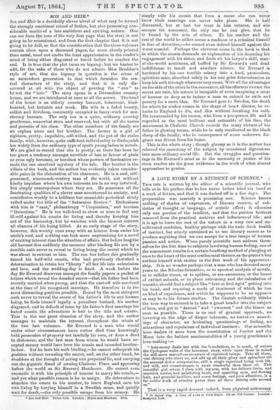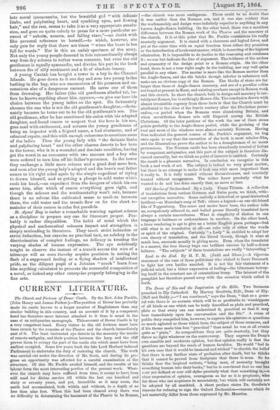A LOVE STORY BY A STUDENT OF SCIENCE.* -.1 Tuts
tale is written by the editor of a scientific journal, who tells us in his preface that he has never before tried his hand at a work of fiction, and that it was dashed off in a few days. The preparation was scarcely a promising one. Science knows nothing of shades of expression, of literary reserve, of sub- tleties of thought or language, of artistic effect; it educates only one portion of the intellect, and that the portion furthest removed from the practical motives and influences of life ; and it is apt to leave the rest of the nature in a very raw and un- cultivated condition, healthy perhaps with the rude fresh health of instinct, but utterly untrained so to use literary means as to produce anything that we can accept for a true image of human passion and action. When purely scientific men address them- selves for the first time to subjects involving human feeling, one of the commonest results is a certain headlong method of plunging at once to the heart of the most sentimental themes,as the grocer's boy surfeits himself with raisins in the first week of his apprentice- ship. It is no wonder perhaps that a man who has devoted many years to the Silurian formation, or to spectral analysis of metals, or to cellular tissue, or to spiders, or sea-anemones, or the bones of extinct animals, or to plane astronomy and the calculation of transits, should find a subject like "love at first sight" getting into his head, and requiring a mode of treatment of which he has no kind of experience, and which he supposes to be as opposite as may be to his former studies. The Cantab evidently thinks the true way to succeed is to take a great header into the subject of love, and get to " dearest " and " sweetest " and the kisses as soon as possible. There is no sort of gradual approach, no hovering on the edge of deeper interests, no tentative sound- ings of character, no hesitating questionings of feeling, no attractions and repulsions of individual instincts. Our scientific hero dashes at once from the constitution of Jupiter and the Moon iuto the baldest sentimentalities of a young gentleman's love-making :—
"Astronomy deals but with the foundations, so to speak, of nature the Cyclopean walls of the basement story, while upon these is raised the still more marvellous structure of organized beings. Take all these, vast shining orbs above us, and add up all their glory and splendour till the amount defies computation, still a single organized being, with life, and will, and consciousness, is more wonderful than them all. This beautiful girl whom I clasp with my arm with her delicate limbs, and sensitive nerves, and palpitating heart, and sparkling eyes, and flowing hair, and graceful intellect, and warm feelings, and pure affections, is a far nobler work of creative power than all these shining orbs around us..'
That is a very rapid descent indeed, from physical astronomy
• St. dunes' Day. A Tale of Love at First Sight. By an Old Cantab. Londosi : 94111/10 n Low.
into moral ipeeacuanha, but the beautiful gill "with delicate limbs, and palpitating heart, and sparkling eyes, and flowing hair," and the rest, seems to take it as a very appropriate conclu- sion, and goes on quite calmly to press for a more particular ac- count of " nebulre, comets, and falling stars,"—no doubt with like personal reference to herself,—to which, however, she only gets for reply that there are times "when the heart is too full for words." Nor is this an unfair specimen, of the story.
Not only the young people descend in this extraordinarily abrupt way from dry science to rather warm romance, but even the old gentleman is equally spasmodic, and divides his part in the book between fits of silly sentiment and a fit of absolute lunacy.
A young Cantab has bought a tower in a bay in the Channel Islands. He goes down to it one day and sees two young ladies bathing in the bay, who are unconscious of his presence and un- conscious also of a dangerous current. He saves one of them from drowning. Her father (the old gentleman alluded to), be- fore he knows anything about him, appears,—to give our hero his choice between the young ladies on the spot. He fortunately chooses the one -who is not the old gentleman's daughter,—fortu- nately because he turns out to be the old gentleman's son. The old gentleman, after he has sanctioned his union with his adopted daughter, and found reason to suspect that the hero is his son, goes mad with excitement, and accuses the young gentleman of being an impostor with a feigned name, a bad character, and of criminal repute, and this with enough coherence to convince some of the ladies. Then the young lady with "the delicate limbs and palpitating heart " and the other charms deserts to her hero in the tower, who is in a wounded and desolate condition, having got the worst in an encounter with two masons and a boy who were ordered to turn him off his father's premises. In the tower they exchange a little more science and a good deal more love, and soon after the young lady's adopted and the hero's real father comes to his right mind again by the simple expedient of trying to drown himself, and so getting a plunge in cold water which cools his head,—an expedient from the dangers of which his son saves him, after which of course everything goes right, and though the science and the sentimentality won't mix, because there is no solvent like cultivated sense to mediate between them, the cold water and the treacle flow on for the short re- mainder of their course in calm flat parallels.
St. Agnes' Bay is rather a remarkable warning against science as a discipline to prepare any one for literature proper. Pro- bably it rather disqualifies. The habit of mind which the physical and mathematical sciences impart and strengthen is simply misleading in literature. They teach strict induction or strict deduction, but exercise no practical tact, no subtlety in the discrimination of complex feelings, no delicacy in treating the varying shades of human expression. The eye sedulously taught to observe the instant of a transit across the wire of a telescope will as soon thereby acquire precision in noting the flash of a suppressed feeling or a flying shadow of intellectual pride, as the diligent pupil of a Johnian "coach" learn from him anything calculated to promote the successful composition of a novel, or indeed any other enterprise properly belonging to the fine arts.































 Previous page
Previous page